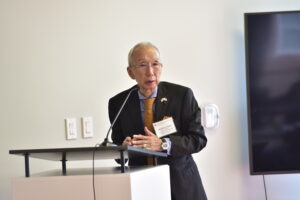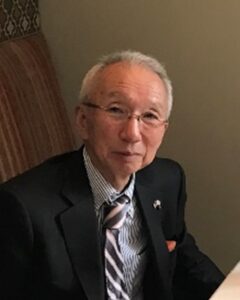64th MUMEI-JUKU (01/02/2023)
Theme:The Truth about the Abe Administration as Seen from the Fourth Floor of the Prime Minister’s Office
Guest speaker: Dr. Tomohiko Taniguchi, Professor of Keio University
<Opening remarks from Dr. Takeda>
We would like to introduce Ⅾr. Taniguchi, who was a speechwriter for former Prime Minister Abe. After a 20-year career at Nikkei Business, he moved to the Ministry of Foreign Affairs, where he was in charge of speeches by foreign ministers. After the Abe administration took office, he took on the role of prime minister’s speechwriter.
In 2015, I had the opportunity to learn about the greatness of today’s lecturer, Dr. Taniguchi. I was in Washington on a business trip when Prime Minister Abe visited the United States and delivered a speech to the US Congress. Although I was certain that the content of the speech would be well prepared by the prime minister himself and those around him, I was concerned because some in the Japanese press had suggested that the Abe administration was nationalistic, and the American press had also taken that tone. With this in mind I watched Prime Minister Abe’s speech to Congress on C-Span, a dedicated congressional news channel. His 45-minute speech was very dignified, with humor and clear, easy-to-hear language.
Prime Minister Abe really put democracy in the forefront of his speech. He spoke very clearly about democracy in Japan and candidly apologized to the American people for starting a reckless war. He also frankly stated that it was a great inconvenience to the people of Asia, and clearly conveyed what previous prime ministers had been unable to say. He concluded his speech with the words, “Japan and the U.S. are moving toward an alliance of hope.
When I heard this speech, I was moved and shaken. I had never imagined that any Japanese could write a speech by a prime minister that would impress the members of the U.S. Congress. The content of this speech must have come from Prime Minister Abe’s own thoughts, and the people at the Ministry of Foreign Affairs and the Prime Minister’s Office must have given him a lot of advice. However, I do not think such a speech would have been possible without the help of today’s lecturer, Dr. Taniguchi.
Even now, the Cabinet plays YouTube video of this event. The other day, I watched it myself, and there were 700-800 posts from young people who had seen this video. I read them verbatim and could see how impressed they were. I urge everyone to watch the video.
After listening to the PM’s speech, I am reminded of Ted Sorenson, the speechwriter who wrote the phrase for President Kennedy’s famous inaugural address “Ask not what your country can do for you, ask what you can do for your country. I thought to myself, “We in Japan finally have a true speechwriter.
In a democratic system, it is necessary to pursue complex policies in the areas of politics, international affairs, industry, science, and technology. A speechwriter is a person who conveys this information to the people in a way that they can understand it clearly. A speechwriter is quite different from a ghostwriter. In the United States, some experts believe that speechwriters were already in existence when George Washington was president, but it is believed that the practice officially began about 100 years ago.
The world today is in even more upheaval than it was in 2015. Around 2015, the U.S.-China friction had not yet surfaced. Nor was it conceivable that a COVID-19 pandemic would occur. Furthermore, the barbaric invasion of Ukraine by Russia’s Vladimir Putin, which began in February of last year, triggered the Taiwan contingency, which is no longer an entirely improbable scenario. I wonder what Prime Minister Abe would have thought if he were still alive.
Former U.S. Secretary of State Henry Kissinger, who will turn 100 years old this May, published a book titled “Leadership: Six Studies in World Strategy” at the end of last year. In the book, Kissinger talks about the future as well as the past. He fears that the social conditions that enabled the emergence of leaders at a time when they were most needed are disappearing. Once again, I would like to ask how we can nurture leaders and what leadership means in universities, industries, and government offices. Based on Dr. Taniguchi’s talk today, I would like to invite you to think and discuss about leadership with us.
◆Comments by Dr. Takeda
I have served as vice president at Tennessee State University in Knoxville, Tennessee. There is a small town, Maryville, right next to Knoxville. There is a small college, Maryville College, with about 1,000 students, which offers a speechwriter training course, and I once visited there out of curiosity. I was curious to know if the Maryville College’s training course could produce good writers. I wondered if it would be able to nurture excellent writers.
At the time, I met David Gergen and had the opportunity to talk with him about many things. He is known as a CNN commentator and was a speechwriter for Nixon, Reagan, and finally Bill Clinton, but he is not well known in Japan. He taught at Harvard Public Service and founded the Center for Public Leadership (CPL) at the Kennedy School. Arthur Schlesinger, a well-known Kennedy speechwriter, is also considered an excellent historian. All of them are deeply knowledgeable and well-educated people.
As for how to foster speechwriters in Japan, I think that it is necessary to enhance democracy in Japan before creating a training course.


